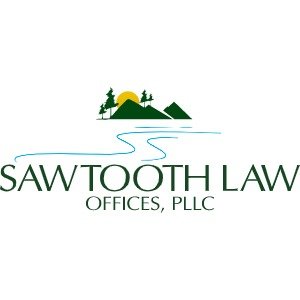Best Sanctions & Export Controls Lawyers in Boise
Share your needs with us, get contacted by law firms.
Free. Takes 2 min.
List of the best lawyers in Boise, United States
About Sanctions & Export Controls Law in Boise, United States
Sanctions and export controls are legal measures that regulate the transfer, sale, and movement of goods, technology, software, and services to foreign countries or entities. In Boise, Idaho, as in the rest of the United States, these laws are primarily governed by federal regulations, with local businesses and individuals needing to comply with complex federal rules. These rules are set to ensure national security, promote foreign policy objectives, and prevent sensitive or dangerous items from reaching sanctioned nations or prohibited actors. Companies in Boise must follow these regulations when shipping products or sharing technology internationally, even if these actions seem routine in their daily business operations.
Why You May Need a Lawyer
Sanctions and export controls are an evolving and intricate area of law. You may need the help of an experienced attorney in a variety of situations, including:
- Selling or shipping products, software, or technology outside the US
- Uncertainty about whether a transaction or relationship may violate U.S. sanctions
- Dealing with a government investigation or audit regarding exports or international transactions
- Receiving a warning or notice from federal agencies such as OFAC, BIS, or the State Department
- Mitigating risks related to mergers, acquisitions, or business expansion involving international entities
- Implementing internal compliance programs for your company
- Facing potential penalties or temporary denial of export privileges
- Seeking advice after self-disclosure of a potential violation
A knowledgeable lawyer can help navigate these situations, mitigate the risk of hefty penalties, and provide guidance to keep your business operations compliant.
Local Laws Overview
While Boise, Idaho, does not have its own set of export control or sanctions regulations separate from federal law, its businesses and residents are required to comply fully with United States rules. The main bodies of federal law include the Export Administration Regulations (EAR), International Traffic in Arms Regulations (ITAR), and regulations enforced by the Office of Foreign Assets Control (OFAC). Certain dual-use goods, military items, financing transactions, and dealings with targeted countries or entities are heavily regulated.
Local agencies and business development offices in Boise may offer support and guidance, but legal compliance remains a federal responsibility. Idaho companies, particularly those in sectors such as technology, agriculture, chemicals, or manufacturing, must be careful when exporting goods or sharing technical data internationally. Consultations with Boise-based attorneys familiar with both federal rules and the local business landscape are highly recommended.
Frequently Asked Questions
What are export controls?
Export controls are laws that restrict the export of specific goods, software, or technology for reasons related to national security, foreign policy, or trade protection. These controls apply to both physical shipments and electronic transfers of information.
What are sanctions?
Sanctions are legal restrictions imposed by the US government against foreign countries, entities, or individuals. They may prohibit certain transactions, financial dealings, or exports to those targets.
How do I know if my goods are subject to export controls?
Determining if your goods are controlled depends on factors such as item classification, destination country, end use, and end user. The Commerce Control List and U.S. Munitions List are key references for figuring out controls.
What is a denied party list?
A denied party list outlines individuals or businesses that US persons are forbidden from doing business with. Multiple government agencies publish these lists, and companies must check customers, suppliers, and partners against them.
What happens if I violate export control or sanctions laws?
Violations can result in civil and criminal penalties, including significant fines, loss of export privileges, and, in severe cases, imprisonment. Enforcement is serious and violations can be prosecuted even if unintentional.
Is software subject to export controls?
Yes, software, especially with encryption, and related technology can be highly regulated. Exporting software, even by allowing downloads from abroad, can trigger compliance obligations.
Do I need a license to export goods from Boise to another country?
You may need a license depending on the nature of the goods, destination, end user, and end use. Some items may be exported under license exceptions, while others require prior government approval.
Are small businesses in Boise impacted by these laws?
Yes, even small businesses must comply. There is no exemption for company size. Understanding compliance is crucial for anyone involved in exports or international markets.
Can I get in trouble for exporting technology through email or cloud services?
Yes. Sharing controlled technical data with foreign persons by email, cloud storage, or other digital means can be considered an export, triggering regulatory requirements.
How can I keep my business compliant?
Develop strong internal compliance programs, regularly screen transactions, educate staff, and consult with legal counsel experienced in Sanctions & Export Controls to stay compliant and prepared for audits or changes in law.
Additional Resources
- U.S. Department of Commerce Bureau of Industry and Security (BIS)
- U.S. Department of State Directorate of Defense Trade Controls (DDTC)
- U.S. Treasury Office of Foreign Assets Control (OFAC)
- Idaho Small Business Development Center (SBDC)
- Local chambers of commerce and trade associations in Boise
- Export.gov for information on exporting and compliance tools
Next Steps
If you are facing a potential sanctions or export control issue, or if you want to ensure your business is compliant, consider the following steps:
- Document all exports, international communications, and compliance efforts
- Conduct a review of your products, services, and customer base to identify potential risk areas
- Reach out to a Boise-based attorney specializing in Sanctions & Export Controls for an initial consultation
- Stay informed about new regulations and guidance from federal agencies
- Consider formal compliance training for relevant staff members
- Do not ignore any government communications or inquiries related to your international business activities
Taking proactive steps to understand and comply with Sanctions & Export Controls laws will help protect you and your business from significant legal and financial risks in Boise and beyond.
Lawzana helps you find the best lawyers and law firms in Boise through a curated and pre-screened list of qualified legal professionals. Our platform offers rankings and detailed profiles of attorneys and law firms, allowing you to compare based on practice areas, including Sanctions & Export Controls, experience, and client feedback.
Each profile includes a description of the firm's areas of practice, client reviews, team members and partners, year of establishment, spoken languages, office locations, contact information, social media presence, and any published articles or resources. Most firms on our platform speak English and are experienced in both local and international legal matters.
Get a quote from top-rated law firms in Boise, United States — quickly, securely, and without unnecessary hassle.
Disclaimer:
The information provided on this page is for general informational purposes only and does not constitute legal advice. While we strive to ensure the accuracy and relevance of the content, legal information may change over time, and interpretations of the law can vary. You should always consult with a qualified legal professional for advice specific to your situation.
We disclaim all liability for actions taken or not taken based on the content of this page. If you believe any information is incorrect or outdated, please contact us, and we will review and update it where appropriate.













